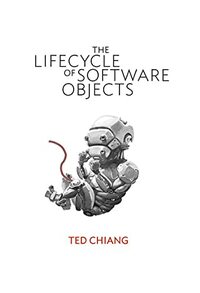Take a photo of a barcode or cover
emotional
informative
mysterious
fast-paced
Plot or Character Driven:
Plot
Strong character development:
Yes
Loveable characters:
Yes
Diverse cast of characters:
Yes
Flaws of characters a main focus:
Yes
Chiang came in with yet another captivating and unnerving sci-fi story this time centered around artificial intelligence and machine consciousness. The Lifecycle of Software Objects explored the idea of essentially raising a tamagotchi pet that actually develops awareness and can be transferred in and out of a physical body -- however, there is no AI takeover in this one. Instead, Chiang masterfully creates a parent-child relationship with these robots through the protagonists, Ana and Derek.
Ana and Derek constantly grapple with deciding how much hand holding these robots need versus letting them grow consciousness on their own, as well as consent and freedom of their existence. Frankly, I would 100% be Wendy who ends up leaving her partner over this whole situation because I truly would not be able to handle this AI nonsense.
Being one of Chiang's longest works, I found that the writing and pacing differed from his other works, and I'm not sure I enjoyed it as much. Additionally, his ending felt almost too abrupt, despite the fact that he often ends his stories like this. I'm not sure if it was the discomfort I have regarding AI consciousness or just the difference in writing here, but it wasn't one of my favorites by him.
Ana and Derek constantly grapple with deciding how much hand holding these robots need versus letting them grow consciousness on their own, as well as consent and freedom of their existence. Frankly, I would 100% be Wendy who ends up leaving her partner over this whole situation because I truly would not be able to handle this AI nonsense.
Being one of Chiang's longest works, I found that the writing and pacing differed from his other works, and I'm not sure I enjoyed it as much. Additionally, his ending felt almost too abrupt, despite the fact that he often ends his stories like this. I'm not sure if it was the discomfort I have regarding AI consciousness or just the difference in writing here, but it wasn't one of my favorites by him.
funny
reflective
medium-paced
Plot or Character Driven:
Plot
Strong character development:
Yes
Loveable characters:
Complicated
Diverse cast of characters:
No
Flaws of characters a main focus:
No
The length is awkward. It either needed to be more concise or needed to add enough to allow me to make an emotional connection with the characters. I WANTED to connect with them. It was an emotional story and yet I felt like I wasn't given enough to actually care. The concept itself was very interesting though.
I just finished reading this in Chiang's Exhalation collection. I wasn't expecting to find a novella tucked away in there. I didn't look at the table of contents too closely and it was honestly a pleasant surprise to find a bit of a longer story because Chiang is so good at world-building and creating characters and worlds you really care about and want to spend more time with. Even though Lifecycle is the longest, I still wanted to spend more time with the characters and learn about what happens with the digients.
It brought up a lot of interesting questions about artificial intelligence that I hadn't come across before. The questions the trainers/owners of the digients have are a mash-up of training a pet and raising a small child. Because the digients are neither of those things, it means there is no road map to follow for what is right and wrong in terms of how they should be raised and when they are mature enough to be autonomous.
I will be reviewing Exhalation separately and highly recommend picking it up. Lifecycle is only the 4th story in the collection but pretty much everyone has moved me in some way.
It brought up a lot of interesting questions about artificial intelligence that I hadn't come across before. The questions the trainers/owners of the digients have are a mash-up of training a pet and raising a small child. Because the digients are neither of those things, it means there is no road map to follow for what is right and wrong in terms of how they should be raised and when they are mature enough to be autonomous.
I will be reviewing Exhalation separately and highly recommend picking it up. Lifecycle is only the 4th story in the collection but pretty much everyone has moved me in some way.
What do you think of when somebody says “general AI”?
Skynet of the Terminator fame nuking all of us back back to the apehood?
Ultron of the Marvel universes attaining sentience in seconds and deciding it would be best to just wipe all of us?
Perhaps the machines of the Matrix universe that subjugates and turned us all into energy cells?
Maybe you think of more sympathetic AIs, such as persecuted replicants from the Blade Runner or big-eyed David from A.I. That just wanted to find his mother?
All of these famed examples operate on a notion of AI having a general intelligence or pushing into the area of super intelligence. “AI is a crackpot” is by far the most explored troupe in fiction.
This novella offers an alternative fascinating view on how AIs would develop. Think of your childhood Tamagotchi or Furby toys somehow sticking through the years and slowly obtaining intelligence as if they were small children with all the complexities and impact on a bigger world such a notion would have.
Skynet of the Terminator fame nuking all of us back back to the apehood?
Ultron of the Marvel universes attaining sentience in seconds and deciding it would be best to just wipe all of us?
Perhaps the machines of the Matrix universe that subjugates and turned us all into energy cells?
Maybe you think of more sympathetic AIs, such as persecuted replicants from the Blade Runner or big-eyed David from A.I. That just wanted to find his mother?
All of these famed examples operate on a notion of AI having a general intelligence or pushing into the area of super intelligence. “AI is a crackpot” is by far the most explored troupe in fiction.
This novella offers an alternative fascinating view on how AIs would develop. Think of your childhood Tamagotchi or Furby toys somehow sticking through the years and slowly obtaining intelligence as if they were small children with all the complexities and impact on a bigger world such a notion would have.
Digients : digital entities, cute AI that can be trained and taught like children. They have virtual food and can talk. The novella follows their growth, first popular, then fewer and fewer users. Some devoted users/owners continue to teach and watch their digients “grow up” as the virtual landscapes change (new additions, companies going bust, and new uses for the AI, etc).
An interesting story bursting with ideas ( some themes in common with Greg Egan ) but this didn’t quite grab me.
My favourite line “The economy goes into recession after the latest flu pandemic, prompting changes in the virtual worlds”.
An interesting story bursting with ideas ( some themes in common with Greg Egan ) but this didn’t quite grab me.
My favourite line “The economy goes into recession after the latest flu pandemic, prompting changes in the virtual worlds”.
**The Lifecycle of Software Objects** by *Ted Chiang* is a charming (if depressing) story of virtual pets who are trained to be cute companions, but when the fad fades – after layoffs and knockoffs – it turns out you can train them up over the years to have intelligence and an understanding of the world. Yes, like children. Hilarity does not ensue, but it's a well-enough-written story that felt realistic. If anything, I'd have appreciated a little less realism – I'm already familiar with all the depressive reality of the software industry, and I'd like something more in my reading.
challenging
reflective
medium-paced
In this novella, Chiang’s characters experience the ups and downs of raising an artificial intelligence. The owners of the artificial beings begin as employees of a company that sells them as virtual-world pets, but when the company fails, they choose not to suspend their charges and complicated questions begin to emerge around the "personhood" of the maturing beings. The large weakness of this well-crafted story is that very little happens in terms of human drama. One could hang an entire novel on the framework of the plot and the philosophical questions it engenders, but the human story is stretched too thin to offer the poignancy that this novella deserves.




